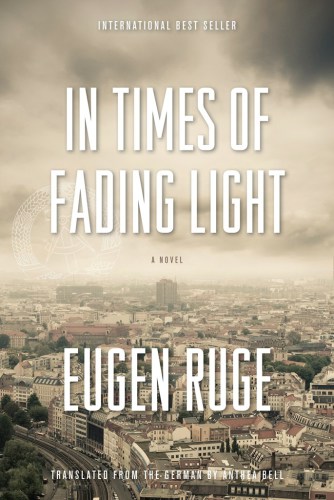
In Times of Fading Light
A Novel
کتاب های مرتبط
- اطلاعات
- نقد و بررسی
- دیدگاه کاربران
نقد و بررسی

March 11, 2013
Ruge’s evocative family chronicle spans nearly 60 years, moving fluidly from 2001 to 1952, with several stops in between. In the small German town of Neuendorf in 2001, elderly Kurt Umnitzer is paid one last visit, before senility completely overtakes him, by his son Alexander, who himself has recently been diagnosed with cancer. As Alexander sorts through Kurt’s belongings and photographs, he delves into the family’s history. Alexander goes to Mexico to learn more about his father, while the story travels back to the 1950s, which find Alexander’s grandmother Charlotte and her husband, Wilhelm, living as loyal communists in East Berlin, along with Kurt and his wife, Irina. Cuba in the 1960s, Russia in the 1970s, and the fall of the Berlin Wall provide further backdrops and catalysts for the Umnitzer family’s troubled journey through the 20th century. Ruge tends to focus on his scenes, which are heavy on both seemingly insignificant detail (the opening sentence puts Alexander on “a buffalo leather sofa”) and plot, combining dense, full-bodied storytelling with an enlightening sense of modern history. Agent: Carolin Mungard, Rowohlt Verlag.

March 1, 2013
A multifaceted look at four generations of an East German family with roots in the Communist Party; this debut was a commercial and literary success in the German author's homeland. The action moves back and forth over 50 years, beginning in 1952, but the central event, witnessed by six different viewpoint characters, occurs in 1989, shortly before the Berlin Wall comes down. The occasion is the 90th birthday party of Wilhelm, the patriarch, an unrepentant Stalinist and Party bigwig. Family members present include Charlotte, his imperious, mean-spirited wife, and his stepson Kurt, a respected Party historian and timid reformer. Conspicuously absent are Kurt's Russian wife and his rebellious son Alexander, who that day has fled to the West. Though ideology is a crucial element of the novel, first and foremost come the domestic concerns that affect any family. Thus, the climax of Wilhelm's party will not be his receiving one more Party honor, nor the news of Alexander's defection, carefully concealed by Kurt, but the collapse of the old folks' dining table, inexpertly assembled by Wilhelm, whose powers are failing. And it is typical of the oblique narration that you might even miss the act that ends his life that same day. Mysteries abound. We first meet Wilhelm and Charlotte in Mexico, refugees from Nazism, ending their 12-yearslong exile. Has Wilhelm been a secret agent for the Soviets? The possibility dangles. Why is there just one tiny reference to Charlotte's first husband, the father of her sons? Those sons were sent to the gulag after Kurt's veiled criticism of Stalin in a private letter to his brother. Kurt did 10 years; his brother was murdered, circumstances undisclosed. Most important, how did Kurt keep his faith in communism after his ordeal? A case of self-deception? His son Alexander believes "everything is deception." It's a grand theme, but it's left undeveloped. Ruge takes full advantage of the varying viewpoints to display, impressively, the density of family life, but a thematic cohesion is lacking.
COPYRIGHT(2013) Kirkus Reviews, ALL RIGHTS RESERVED.

Starred review from April 15, 2013
Ruge, son of a well-known East German historian, began his writing career in the GDR but fled to the West in 1988 because, as he put it, East Germany bored him and he couldn't write about it. But he has finally been able to do so, and the result is a deeply personal Familiendrama that also manages to be a rather pointed political critique of East German society. In interviews, Ruge has made it clear that In Times of Fading Light is a very loosely fictionalized version of his own family's story; he has also said that he could not write it until all the family members portrayed were dead. It is not hard to see why: though Ruge portrays all of his charactersfrom senile arty stalwart Wilhelm to Russian transplant Irina to straying professor Kurtwith great tenderness, his story is at its core a depiction of a family's dissolution, the consequence of intergenerational conflict and bleak historical circumstances. There isn't any nostalgia here, just a deeply plaintive examination of personal and political tragedy.(Reprinted with permission of Booklist, copyright 2013, American Library Association.)

























دیدگاه کاربران